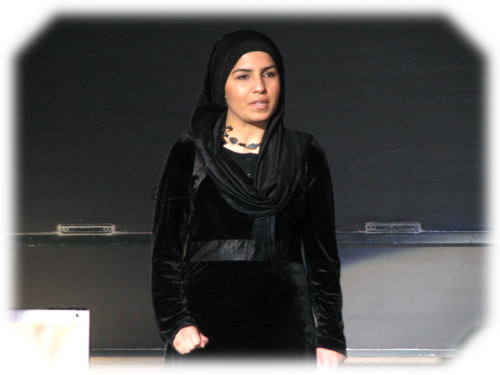
By Janine Chow:
Wazhma Sadat stood erect on stage. Clad in black, hands clenched by her side. Not walking, not gesticulating. She didn’t move at all. But she held her audience spellbound.
“How is it not to live in war?”
This was TEDx Yale. As one of the only Afghans in Yale, Sadat had been invited to speak at the conference. Despite her confession to having been nervous about public speaking, her oration, delivered with striking pathos, stood out among twenty-four other exceptional speeches for its sheer stunning power.
Today, Wazhma Sadat shared with us her voice and her extraordinary story.
She spoke of Afghanistan at war, of a childhood plagued by constant fear—taking refuge in the basement, futilely attempting to shut her senses to the wrenching daily reality of the sound of jets that came at 3:00 in the morning. She spoke of a broken Afghanistan thirteen years later, of an old and beloved teacher who was “happy” to have lost his sight and most of his hearing so he did not “see the children begging on the street” or “hear the sound of the bombs.” She spoke of a people “who still don’t know how to not to live in war.”
Sadat spoke, most of all, of a country bereaved of its voice.
When she visited her old teacher, she asked him what he thought of the increasing lack of security in Afghanistan. “He thanked me for being the first person who ever asked him what he thought.”

Here, Sadat said, she really understood the value of people and the human voice.
As Afghanistan rebuilds itself, she said, the decision makers do not listen to the vast majority of the population, the “average Afghans who are teachers and farmers and shopkeepers.” A small group of people implement their projects “without remembering that they [the everyday Afghans] have a voice in the rebuilding of our country as well.”
“I wanted to hear them,” said Sadat as the audience hung on her words. “I wanted them to believe they had a voice.” And so she related how she began a program that markets Afghan women’s products in the United States. Even if they cannot communicate with words, “they communicate with the flowers they embroider and the products” they send to the U.S.
Communication can be achieved, she seemed to say, without even language or common experience. “Humanity alone can be the best tool to communicate.”
“I want to leave you with one thought,” she concluded. “The difference between me as a Yale student and all the women [in Afghanistan] is that one day, someone came up to me asked me what I thought. And that gave me the confidence to be where I am today.”
An electrified audience gave Sadat standing ovation. And as the cheers and applause continued on and on in evermore enthusiastic volume, I for one wished to communicate with Wazhma Sadat myself, simply to know this rare person and her beautiful message just a little bit better.
***
Amidst tumultuous applause, Yale’s first ever TEDx conference drew to a close. A large wave of people peeled out of the room, voices buzzing with excited (if exhausted) reflection on the talks. I walked the length of the room, searching, searching—there! Wazhma Sadat sat in the front row before the stage.
I wanted to meet her. I wanted to hear more from her, to learn from her. I wanted so badly to tell her how strongly she had struck me, how beautiful I found her speech, how powerfully her words about communication through humanity and human connection had resounded with me. What with my nerves, my suitemate literally had to push me forward to begin conversation.
I didn’t manage to tell her everything I had wanted to tell her. But I did manage to secure an interview for the Globalist!
Wazhma was a warm conversationalist. We reflected on her TED talk, bouncing from topic to topic. We talked about how, for the people of Afghanistan, it is “hard to look at what’s not war.” She told me how they’re still adjusting to “waking up and not thinking about suicide bombs.” Then we spoke about the women she endeavors to empower, to connect with, to empathize with. “No one really listens,” she said softly.
But listening is the root of communication.
I asked Wazhma about the person she had mentioned in the conclusion of her talk, the person who had asked her what she thought. She told me that he was an American who had interviewed her for a particularly competitive program. She told me how she had studied English in for this interview, and had prepared words in English for any question he might ask.
But then he had asked: “What do you think about the power of people in Afghanistan?”
“I just paused,” she told me. “I said, ‘I don’t have an answer.’”
The pursuit of the voice and the words to answer his question brought Wazhma to the electric story she had related earlier. I asked again after the American who had asked the question.
His name, as it happens, is Ted. And he is a Yale alumnus from 1958.
Wazhma had ultimately developed a relationship with Ted over the years. “He would send me New York Times articles every day,” she related, smiling.
And today, we are infinitely lucky to have Wazhma Sadat among our ranks as a Yalie.
I look forward to more conversations with her.
Janine Chow is a freshman in Jonathan Edwards College. Contact her at janine.chow@yale.edu.